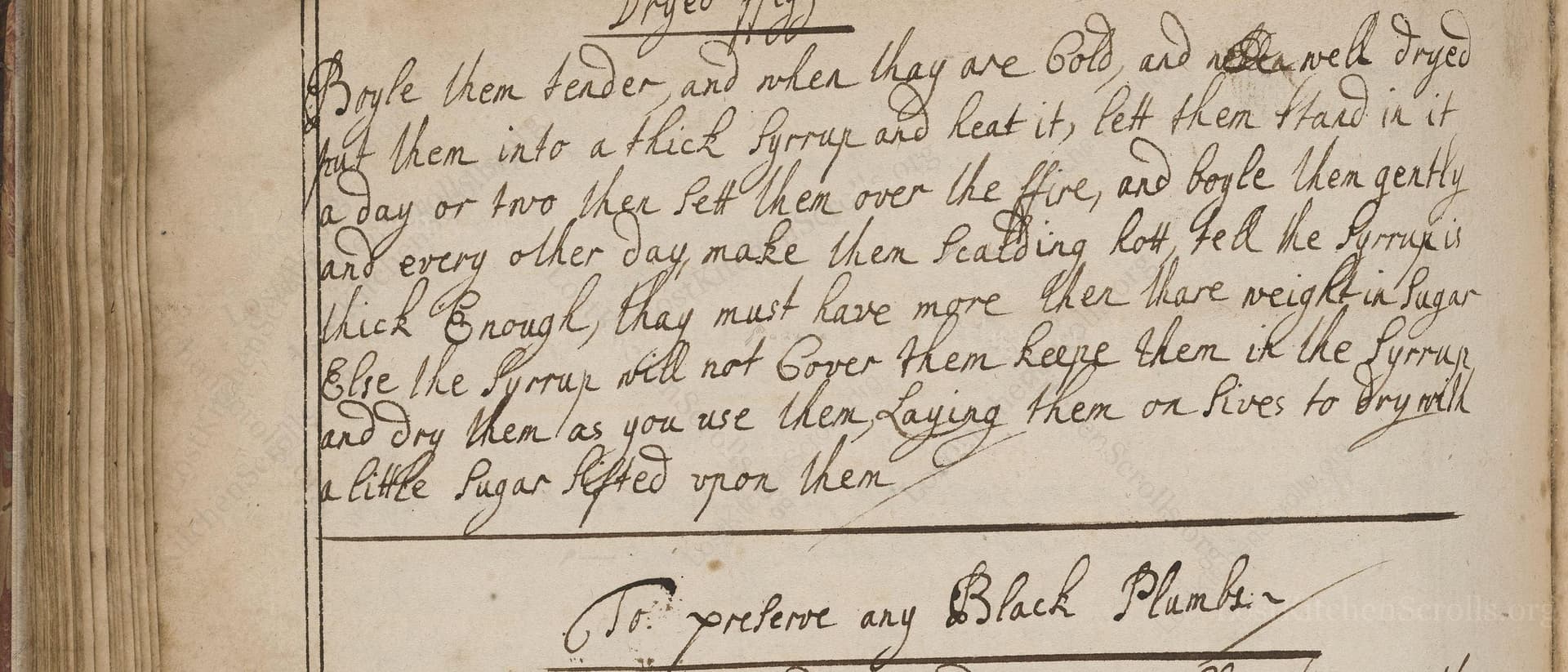Dryed Figgs
From the treasured pages of Cookery and medicinal recipes by Kendall Rose and Anne Cater
Written by Rose Kendall, Anne Cater, Elizabeth Clarke, Anna Maria Bold

Dryed Figgs
"Boyle them tender when they are cold and well dryed put them into a thick Syrrup and heat it, lett them stand in it a day or two then sett them over the fire, and boyle them gently till they make them scalding hott, tell the Syrrup is thick Enough, they must have more then their weight in Sugar Else the Syrrup will not Cover them keepe them in the Syrrup and dry them as you use them Laying them on Sieves to dry with little Sugar Sifted on them"
Note on the Original Text
The recipe employs the less formal, run-on style typical of manuscript cookery instructions from the late 17th century, assuming the reader's kitchen competence and understanding of basic processes like syrup-making and fruit drying. Spelling is old-fashioned and variable ('boyle' for 'boil', 'Syrrup' for 'syrup', 'lett' for 'let'), and punctuation is sparse. Instructions are given in a sequential flow, without listing ingredients separately, and quantities are approximated or related to the volume of fruit, reflecting both the episodic nature of cooking and the absence of precise measurement tools.

Title
Cookery and medicinal recipes by Kendall Rose and Anne Cater (1712)
You can also click the book image above to peruse the original tome
Writer
Rose Kendall, Anne Cater, Elizabeth Clarke, Anna Maria Bold
Era
1712
Publisher
Unknown
Background
Step into the inviting kitchens of the past with this enchanting collection of culinary wisdom from England's early modern era. Crafted by a talented array of women, this book promises savory pies, sweet confections, and secret family recipes—an aromatic tour through centuries-old feasts sure to delight the curious palate.
Kindly made available by
Folger Shakespeare Library
This recipe stems from the late 17th to mid-18th century, when sugar preserves were both a culinary art and a means of preservation. At the time, sugar was still a luxury item, used with a generous hand to showcase wealth and skill. The recipe comes from a household collection belonging to several women, notably Rose Kendall, Anne Cater, Elizabeth Clarke, and Anna Maria Bold, reflecting the pivotal role of women in domestic culinary manuscript culture. Dried fruits and sugared preserves were central to festive tables and daily fare alike, mediating between medicine, luxury, and sustenance in early modern British households.

Back in the day, this recipe would require a large, heavy-bottomed copper or brass preserving pan, sturdy wooden spoons, and coarse linen towels. Boiling would be done over an open hearth, while drying would use broad shallow woven sieves or wooden racks set in a warm, airy corner of the kitchen. The sugar would be hand-refined, perhaps beaten and sifted by hand, making the entire process rather labor-intensive but rewarding.
Prep Time
20 mins
Cook Time
1 hr
Servings
8
We've done our best to adapt this historical recipe for modern kitchens, but some details may still need refinement. We warmly welcome feedback from fellow cooks and culinary historians — your insights support the entire community!
Ingredients
- 1 lb dried figs
- 3 cups granulated sugar (plus extra for dusting)
- 1 cup water
Instructions
- Begin by simmering dried figs in water until they are tender, about 20-30 minutes.
- Let them cool completley, then drain and gently pat them dry with a clean towl.
- Meanwhile, make a thick sugar syrup: for every 1 pound of figs, use about 3 cups of granulated sugar and 1 cup of water.
- Dissolve the sugar in water over medium heat, stirring until clear.
- Add the figs to the hot syrup and heat gently, allowing them to soak for at least 24-48 hours.
- After soaking, return the pot to low heat and simmer the figs in the syrup until both are very hot and the syrup is thickened (about 10-15 more minutes).
- Use enough syrup so that all the figs are covered.
- Store the figs in the syrup until ready to use.
- When desired, drain the figs and lay them on a wire rack or sieve, dusting them lightly with sugar, and let them dry until slightly tacky.
Estimated Calories
260 per serving
Cooking Estimates
You will simmer the figs, let them cool, make a syrup, soak the figs, and then cook them again. Most of the time is hands-off, waiting for figs to soak or cool. Each serving is about 85 grams and has around 260 calories.
As noted above, we have made our best effort to translate and adapt this historical recipe for modern kitchens, taking into account ingredients nowadays, cooking techniques, measurements, and so on. However, historical recipes often contain assumptions that require interpretation.
We'd love for anyone to help improve these adaptations. Community contributions are highly welcome. If you have suggestions, corrections, or cooking tips based on your experience with this recipe, please share them below.
Join the Discussion
Rate This Recipe
Dietary Preference
Main Ingredients

Den Bockfisch In Einer Fleisch Suppen Zu Kochen
This recipe hails from a German manuscript cookbook compiled in 1696, a time whe...

Die Grieß Nudlen Zumachen
This recipe comes from a rather mysterious manuscript cookbook, penned anonymous...

Ein Boudain
This recipe comes from an anonymous German-language manuscript cookbook from 169...

Ein Gesaltzen Citroni
This recipe, dating from 1696, comes from an extensive anonymous German cookbook...
Browse our complete collection of time-honored recipes



